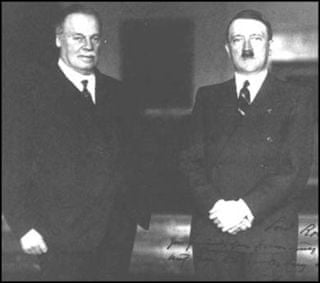One of the things that always makes me furious is the knee-jerk stupidity of saying that the Daily Mail used to support fascism, thereby implying that it is somehow tainted goods in its modern form.
I certainly have my differences with the politics of the modern Mail, but it is blind prejudice to link what it published, for a brief period, in the 1930s to what it does today.
So I was delighted to see on Anna Raccoon's blog last week a piece by Matt Wardman in which he presented a media history lesson.
He omitted a crucial fact and I'll come to that in a moment. But he made two very important points - firstly, the Mail was not the only paper to carry articles supporting Oswald Mosley's blackshirts. The Daily Mirror did too.
Secondly, trying to criticise the 2011 Mail by pointing to an 80-year-old aberration lacks any value whatsoever. It not only had no lasting effect on the Mail. It had almost no effect even at the time.
What Wardman did not do, however, was make the ownership nexus between the Mail and Mirror of the 1930s clear enough. That isn't so surprising because it was anything but clear and remains a matter of dispute.
Let's get the undisputed facts out of the way first. At the beginning of the 1930s, the then Viscount Rothermere (Harold Harmsworth) owned the Mail and the Mirror.
In January 1934, he wrote - under his own byline - articles that appeared in both the Mail and the Mirror. The former was headlined "Hurrah for the Blackshirts". The latter was headlined "Give the Blackshirts a helping hand."
Within a year, he had removed his support for Mosley's party, though he remained an admirer of both Hitler and Mussolini. Indeed, he met and corresponded with Hitler, even congratulating him on his annexation of Czechoslovakia.

So we can be under no illusion that Rothermere the First was a supporter of the Nazis. And he had the power to say so through his Mail ownership - at least until the declaration of war. I'll pick that up in a moment also.
What then of the Mirror? It is generally thought that Harold secretly sold off his interests in the Mirror in the early 1930s. However, the paper's ownership following his supposed sale remained uncertain in 1934.
It is therefore likely that the Mirror's then editor, Harry Guy Bartholomew, felt himself obliged to publish an article by a man he considered to be, if not the proprietor, then almost certainly still its largest shareholder.
That said, it would appear that Bart was none too troubled by Rothermere's sentiments. Wardman points to Chris Horrie's Tabloid nation: From the birth of the Mirror to the death of the tabloid newspaper, in which he reveals that Mirror readers were urged to join Mosley's party.
The Mirror's sister paper, then known as the Sunday Pictorial, even ran pictures of uniformed blackshirts playing table tennis and enjoying a sing-song around a piano. Both titles also planned a beauty contest aimed at finding Britain's prettiest woman fascist.
Not many people know that. Certainly, nothing like as many as know that the Mail ran Rothermere's "Hurrah for the Blackshirts" (which is Wardman's point).
He isn't doing down the Mirror. He is merely saying that it is unfair that one title should suffer from the association with fascism while the other doesn't.
But there is more context that is important. Harold's son, Esmond (Rothermere the Second) assumed control of the Mail before Harold died in 1940. Its coverage from the outbreak of war the year before reveals not a scintilla of support for Hitler.
It is also important to view Harold's misguided views through the prism of widespread support for appeasement, not least from The Times under the editorship of Geoffrey Dawson and, of course, many leading politicians.
Lastly, it is also the case that the Mail of the 1930s was not nearly as influential as the Daily Express and its owner, Lord Beaverbrook.
And it was the Express, in March 1933, that ran a splash headlined "Judea declares war on Germany: Jews of all the world unite in action".
It was an overblown report about an (alleged) boycott against German goods that was declared in response to anti-Semitic activities by the Nazis. The "boycott" was quickly repudiated by the Jewish board of deputies in Britain.
Beaverbrook, who is generally regarded as not having been anti-Semitic and was a close friend of Churchill, is also remembered for his famous prediction: "There will be no war in Europe." His Express splashed that on 1 September 1939, the day Hitler invaded Poland, and the war began.
The point is: damn the Mail if you will for what it publishes now. But Rothermere the Second, Rothermere the Third (Vere) and now Rothermere the Fourth (Jonathan) cannot be held responsible for the views of the first of their line.
